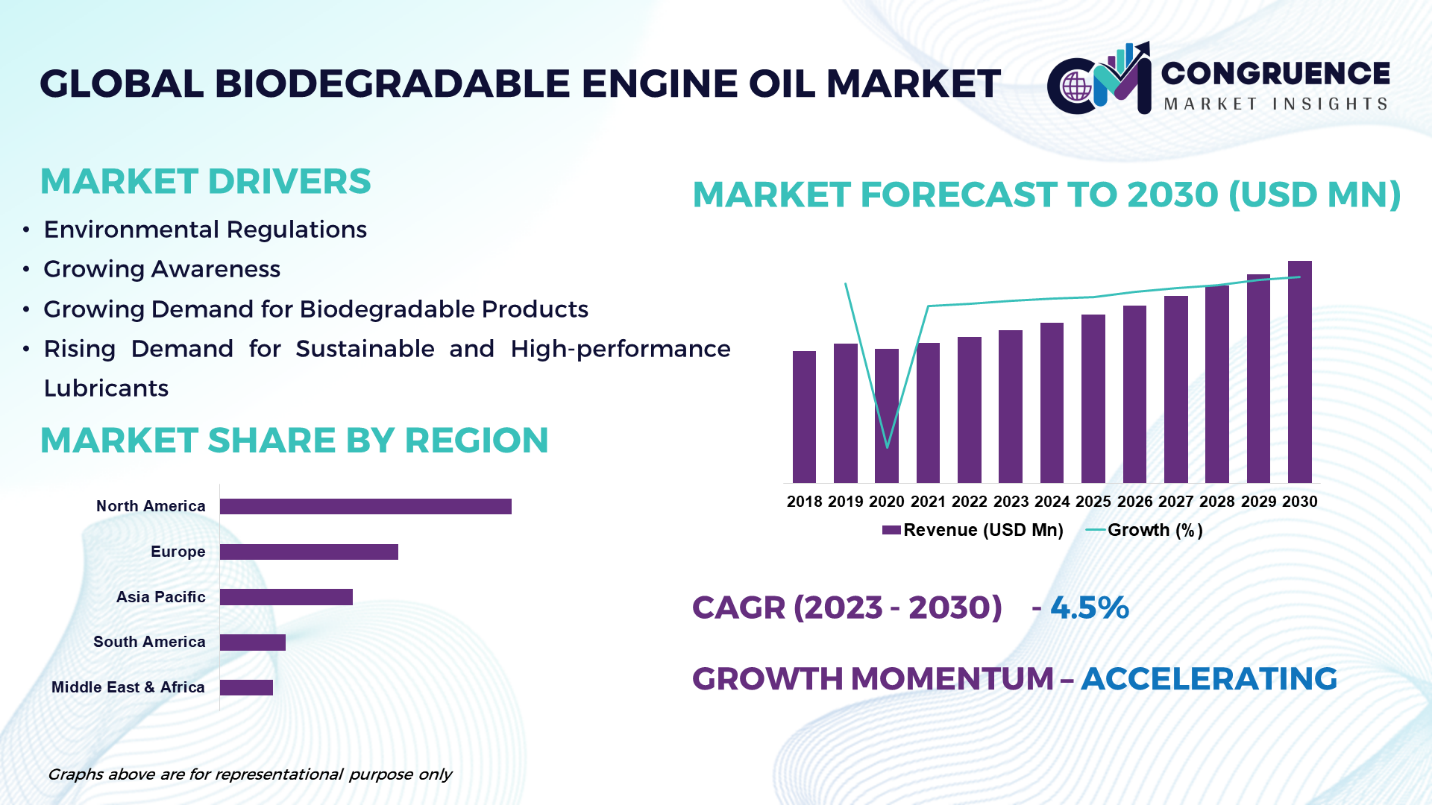Reports
The Global Biodegradable Engine Oil Market is expected to expand at a CAGR of 4.5% between 2023 and 2030. Biodegradable engine oil is also known as bio lubricants that are designed to degrade naturally and quickly in the environment by the actions of biological organisms. These oils are non-toxic and biodegradable lubricants, generally made with using raw materials such as palm oil, sunflower oil, coconut oil, and rapeseed oil. This replaces the non-renewable and non-biodegradable petroleum base used in conventional oils. Biodegradable engine oils provide several advantages over conventional petroleum-based product including sustainability, non-toxicity, renewability, environmental friendliness, and compatibility. Biodegradation is a procedure that changes or degrades substances that enter the environment. The global biodegradable engine oil market is classified on the basis of type, into vegetable oils, polyalkylene glycols, synthetic esters and others. The market is influenced by factors such as environmental regulations, growing awareness, growing demand for biodegradable products, and rising demand for sustainable and high-performance lubricants. The biodegradable engine oil market serves for various applications across several industries including automotive, marine, construction, transportation, agriculture, among others.

Biodegradable Engine Oil Market Major Driving Forces
Environmental Regulations: Governments across the globe are increasingly introducing stringent environmental regulations aimed at reducing environmental pollution. These regulations are driving the demand for biodegradable engine oils.
Growing Awareness: The rising awareness among consumers and industries about the environmental impacts of conventional engine oils drives the demand for biodegradable engine oils. As more people are become aware of the benefits of biodegradable engine oils, they are seeking for eco-friendly options including biodegradable engine oils.
Growing Demand for Biodegradable Products: The market growth is influenced by the increasing demand for biodegradable products due to growing concerns of carbon footprints. By using biodegradable engine oils, industries can significantly reduce their carbon footprint and contribute to a cleaner, and green environment.
Rising Demand for Sustainable and High-performance Lubricants: The major factor driving the market for the biodegradable engine oil is the rise in demand for sustainable and high-performance lubricants. Increase in environmental concerns drives the demand for biodegradable engine oils to reduce environmental impacts.
Biodegradable Engine Oil Market Key Opportunities
Growing Automotive Sector: The rapidly growing automotive sector particularly in developing economies is expected to provide lucrative opportunities for market growth. Growing sales of passenger and commercial cars are propelling the global automotive industry, which is anticipated to boost the biodegradable engine oil market.
Increased Consumption of Vegetable Oil: The increased consumption of vegetable oil is anticipated to create significant opportunities for the biodegradable engine oil market to expand. Most of the lubricants are composed of mineral oil obtained from petroleum oil, which is incompatible with the environment due to its toxicity. Vegetable oil can also play a significant role in replacing petroleum lubricants, as it has several advantages over base lubricants, including eco-friendliness, biodegradability, and lower toxicity.
Technological Advancements: Continuous research and development activities in biodegradable lubricants can provide opportunities for the development of high-performance lubricants. These advancements have led to the development of cost-effective biodegradable lubricants by reducing production costs. Furthermore, increase in funding for the development of biodegradable engine oil with improved performance, and compatibility provide better opportunities for market expansion.
Biodegradable Engine Oil Market Key Trends
· The increasing adoption of biodegradable engine oils in automotive sector due to regulatory requirements is a major factor driving the demand of biodegradable engine oils
· Growing environmental concerns about climate change and environmental sustainability are influencing demand for eco-friendly lubricants
· Stringent environmental regulations are increasingly demanding for sustainable products to reduce environmental impacts
· Growing focus on circular economy in which used materials are reused for the production of biodegradable engine oils
· Ongoing research and development efforts for the development of high-performance of biodegradable engine oils
· Growing adoption of biodegradable engine oils in several industries including construction, agriculture, and marine applications

Market Competition Landscape
The global biodegradable engine oil market is witnessing growing competition among established and emerging players. Major players operating in the market are focused on expanding product portfolios, introducing cost-effective products, and eco-friendly lubricants solutions. Key players in the biodegradable engine oil market engage in strategies aimed at gaining a competitive edge. These strategies include product innovation, differentiation, and the incorporation of sustainable and eco-friendly materials to meet evolving design consumer preferences. Established brands leverage their reputation for quality and reliability to maintain market share, while newer entrants focus on disruptive innovations and unique selling propositions.
Key players in the global biodegradable engine oil market implement various organic and inorganic strategies to strengthen and improve their market positioning. Prominent players in the market include:
· Castrol Limited
· BP p.l.c.
· China Petrochemical Corporation.
· TotalEnergies
· Exxon Mobil Corporation
· Royal Dutch Shell plc
· Condat Lubrifiants
· United Oil Company
· Fuchs SE
· Repsol S.A.
· Chevron Corporation
· Klüber Lubrication
· Renewable Lubricants Inc.
· The WoolRoom Deluxe
|
Report Attribute/Metric |
Details |
|
Base Year |
2022 |
|
Forecast Period |
2023 – 2030 |
|
Historical Data |
2018 to 2022 |
|
Forecast Unit |
Value (US$ Mn) |
|
Key Report Deliverable |
Revenue Forecast, Growth Trends, Market Dynamics, Segmental Overview, Regional and Country-wise Analysis, Competition Landscape |
|
Segments Covered |
· By Type (Vegetable Oils, Polyalkylene Glycols, Synthetic Esters and Others) · By Application (Automotive, Agriculture, Transportation, Construction, Marine, and Others) · By Sales Channel (Direct Sales, Distributors & Wholesalers, Online Retailing, and Others) |
|
Geographies Covered |
North America: U.S., Canada and Mexico Europe: Germany, France, U.K., Italy, Spain, and Rest of Europe Asia Pacific: China, India, Japan, South Korea, Southeast Asia, and Rest of Asia Pacific South America: Brazil, Argentina, and Rest of Latin America Middle East & Africa: GCC Countries, South Africa, and Rest of Middle East & Africa |
|
Key Players Analyzed |
Castrol Limited, BP p.l.c.,China Petrochemical Corporation.,TotalEnergies,Exxon Mobil Corporation,Royal Dutch Shell plc,Condat Lubrifiants,United Oil Company,Fuchs SE,Repsol S.A.,Chevron Corporation,Klüber Lubrication,Renewable Lubricants Inc., and Nandan Petrochem Limited |
|
Customization & Pricing |
Available on Request (10% Customization is Free) |
